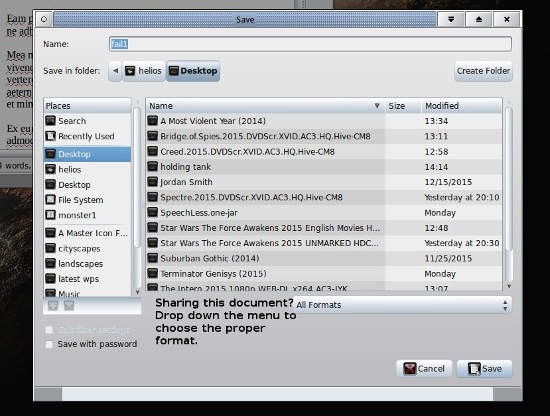The Raspberry Pi Report
Some of you might have received a Raspberry Pi for Christmas or know of a family member or friend who received one. While some of us know exactly what to do with the devices and what peripherals to buy, that does not hold true for a majority of non-technical people. This article, focused on the Raspberry Pi 2 B, will help serve as a guide to answer questions you or someone you know might have.
 What equipment do I need? If you did give or receive a Raspberry for Christmas, hopefully it was part of a kit where all the necessary parts are included. If not, you may be asking what you need to get started.
What equipment do I need? If you did give or receive a Raspberry for Christmas, hopefully it was part of a kit where all the necessary parts are included. If not, you may be asking what you need to get started.



 The problem is just One Little Thing…something so infinitesimal that it would be easy to gloss over and wave one’s hand in dismissal.
The problem is just One Little Thing…something so infinitesimal that it would be easy to gloss over and wave one’s hand in dismissal.
 There was a time, back when FOSS Force was young, when we called the weekly round-up Friday FOSS Week in Review. Sometimes we’d get so far behind in our work that the Friday column wouldn’t get published until Saturday, sometimes late in the afternoon. To solve the problem that caused with the column’s title, we pulled a page from an old ABC playbook, from when they owned the Monday Night Football franchise, and called these late roundups “Friday FOSS Week in Review — Special Saturday Edition.” We didn’t change the header, but always made the “Saturday edition” mention in the text of the column, just as if it was the most natural thing in the world.
There was a time, back when FOSS Force was young, when we called the weekly round-up Friday FOSS Week in Review. Sometimes we’d get so far behind in our work that the Friday column wouldn’t get published until Saturday, sometimes late in the afternoon. To solve the problem that caused with the column’s title, we pulled a page from an old ABC playbook, from when they owned the Monday Night Football franchise, and called these late roundups “Friday FOSS Week in Review — Special Saturday Edition.” We didn’t change the header, but always made the “Saturday edition” mention in the text of the column, just as if it was the most natural thing in the world.

 First things first: I know that the wide number of variants in the BSD family are primarily aimed at servers. That said, it’s clearly understandable that with the exception of
First things first: I know that the wide number of variants in the BSD family are primarily aimed at servers. That said, it’s clearly understandable that with the exception of  It’s almost Christmas, which means that the day isn’t far off when ol’ Father Time rolls the odometer over yet again. This, of course, is the time of year when news writers like to publish lists, partly because they’re easier to write than real news stories. It’s not that we’re lazy, mind you, we’re just too busy shopping and decorating and drinking egg nog…especially drinking egg nog. We love drinking egg nog.
It’s almost Christmas, which means that the day isn’t far off when ol’ Father Time rolls the odometer over yet again. This, of course, is the time of year when news writers like to publish lists, partly because they’re easier to write than real news stories. It’s not that we’re lazy, mind you, we’re just too busy shopping and decorating and drinking egg nog…especially drinking egg nog. We love drinking egg nog. For a while they seemed to come almost in a measured release. They ranged from polite, insightful and informative, to a collateral-damage-be-damned raging and slashing diatribe. Some I would read; some I would not. No one takes a spitting, enraged person seriously unless they bear a weapon. Spitting, angry people tend to come forward with an obvious emotional outburst, most times presenting only the emotional aspect of what they have to say. Facts can be either few or “facts” from that writer’s point of view. Not a lot of us pay attention to someone presenting themselves in such a way. Maybe in a Donald-Trump-train-wreck sort of way, but as serious or meaningful presentations, that just doesn’t happen.
For a while they seemed to come almost in a measured release. They ranged from polite, insightful and informative, to a collateral-damage-be-damned raging and slashing diatribe. Some I would read; some I would not. No one takes a spitting, enraged person seriously unless they bear a weapon. Spitting, angry people tend to come forward with an obvious emotional outburst, most times presenting only the emotional aspect of what they have to say. Facts can be either few or “facts” from that writer’s point of view. Not a lot of us pay attention to someone presenting themselves in such a way. Maybe in a Donald-Trump-train-wreck sort of way, but as serious or meaningful presentations, that just doesn’t happen.
 When all browsers are on board, it’s certain that high traffic websites will adopt WebP as their graphics format of choice. Google is already converting most if not all graphics uploaded to Google+ to WebP to deliver to browsers supporting the format.
When all browsers are on board, it’s certain that high traffic websites will adopt WebP as their graphics format of choice. Google is already converting most if not all graphics uploaded to Google+ to WebP to deliver to browsers supporting the format.